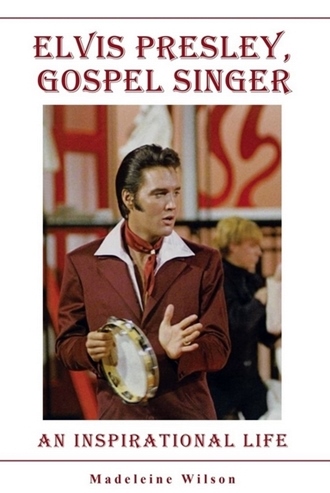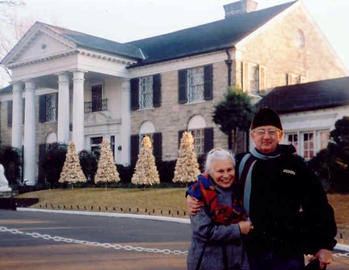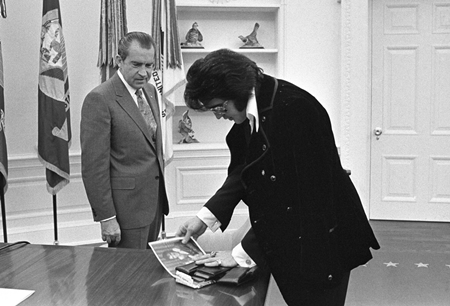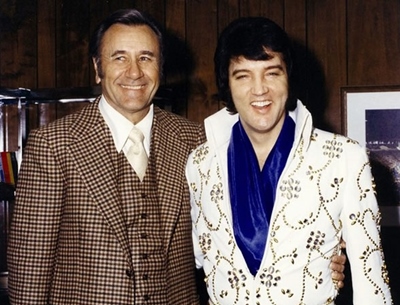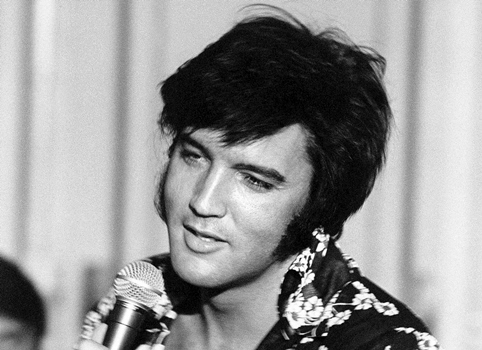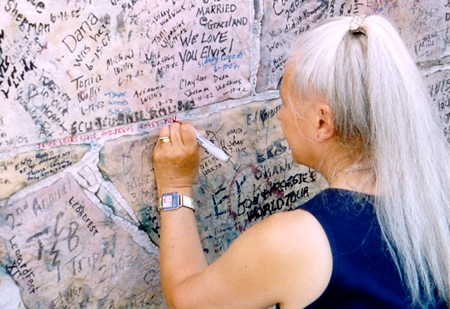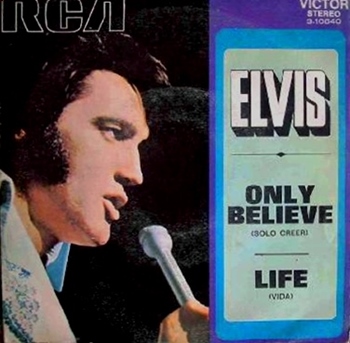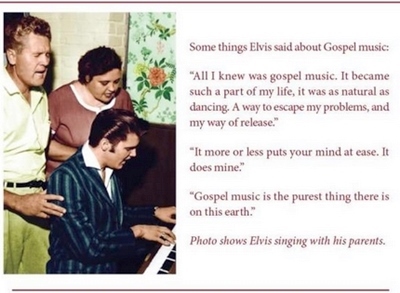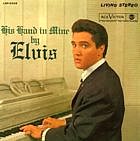 |
 |

EIN: Madeleine, who is Madeleine Wilson and how did you become an Elvis fan? MW: I was born in 1944 in the village of Cottingham in East Yorkshire, England. Being an only child, I had quite a sheltered upbringing, but not so sheltered that I did not listen to Elvis’ records as a teenager, though I was not a fan at the time. Being of a curious mindset, I was very interested in science and obtained a Bachelor of Science degree in Chemistry from Hull University. I then went on to engage in research at Imperial Chemical Industry Ltd in Harrogate, followed by training to become a teacher, after which I taught Chemistry and Maths in the local college and schools.
That whole meeting was beautifully bizarre, including Elvis asking if two of his friends who were waiting outside the Oval Office for him to emerge, could also come in to meet their President. Of course, permission was given - who can refuse Elvis! However, the crux for me was at a time near the end of the meeting, when President Nixon went behind his desk where he kept some small gifts that he gave to visitors. Elvis, overcome with curiosity, joined the President rummaging thought the drawer for suitable gifts, making suggestions such as “that would be great for Priscilla”, also asking for some for his friends. I fell in love with Elvis’ childlike innocence and curiosity.
After watching the programmes, I wept for a week. I considered that it might be tears of mourning as I do not remember hearing about Elvis’ death in 1977, never mind remembering where I was at the time. I was a young mother of two small children, very much caught up with celebrations of our Queen Elizabeth’s Silver Jubilee. However, it was such a strong experience, that I prayed and asked the Lord what it was all about, and felt led to start researching into Elvis’ life, discovering that not only was he brought up as a Christian, but that he was called to be an evangelist. EIN: Your book, Elvis Presley, Gospel Singer – An Inspirational Life, was recently published. In 2002, you released the booklet, Prayers of Elvis. Is your new book an extension of that publication and did you always envisage a more detailed, follow up book? MW: Yes, my book Elvis Presley, Gospel Singer – An Inspirational Life, is an extension of Prayers of Elvis, though I don’t think I envisaged a follow up book. It just kind of happened, however I seem to remember that one or two people had suggested that I write a book. I had been writing articles for our Elvis Gospel Fan Club newsletter and realised what an interesting life Elvis had, and that his influence is still being felt, so thought it would be good to express that in a book EIN: How long did it take you to write the book? MW: The research has taken over 25 years, but I seriously started pulling it altogether about 3 years ago. EIN: How did you approach your research? MW: By reading books, there are about 150 (you may have a more accurate number*), though I have only read 114. I also searched Elvis web sites (EIN is a wonderful source which I have used a lot) and Facebook pages. I have also interviewed some of Elvis’ family, friends and the gospel singers and musicians who backed him on stage. I also listened to interviews with Elvis and people who knew him. *EIN comment: According to the bibliographic source, Elvis In Print: The Definitive Reference and Price Guide, more than 3,500 books directly about Elvis have been published. This includes English language, non-English language, non-fiction, fiction, and Kindle only releases. EIN: Madeleine, did you discover anything new about Elvis and his faith when writing the book? MW: My research just added to and confirmed what I had initially discovered and thought about Elvis - that he was a wonderful, loving, caring, spiritual, sometimes mentally tortured person with a great sense of humour.
Elvis in 1974 with Oral Roberts, Christian televangelist.
EIN: Growing up in the potent Bible Belt of America, living for a time in the poverty-stricken Shake Rag area of Tupelo, and being exposed to faith based and revivalist gospel, unpretentious country, and subversive/profane rhythm and blues, Elvis’ formative years were dominated by family, religion, race, and music. Throughout his life, Elvis’ relationship with Christianity appears to have been a complex one. In your view, did these the tensions between these early influences contribute to internal conflicts for Elvis, or was it more the temptations presented by his later fame and celebrity? MW: I would say that Elvis’ relationship with the established Christian Church rather than Christianity, was a complex one. He had no problem with believing that Jesus Christ is the son of God and that he died as a perfect sacrifice and rose again from the dead so that everyone can be forgiven, and in this life start a wonderful eternal relationship with God. His difficulty with the established church started when he was becoming famous, not only for his singing, but as seen by some, his lewd gyrations on stage. Several preachers would preach against him as a being bad influence on the youth of the day. He could not understand their reaction and was deeply hurt by it. He was not intentionally being lewd, he was just expressing the joy of life with his body as he sang, which some people misinterpreted. In his early days of fame, he still tried to go to church services especially his home church in Memphis. However, although he would sneak in late and sit at the back, his very presence caused a stir and people would turn round to look at him, taking their attention off the preacher. This disturbed Elvis as he did not want to be a distraction, so he stopped attending church. It is true that during in his early days of fame Elvis did feel that he was straying off the right track with some of his behaviour, as shown by the comment he made to his pastor the Rev. James Hamill in Memphis after the Easter service 1958. Elvis told him, “Pastor, I’m the most miserable young man you’ve ever seen. I got all the money I’ll ever need to spend. I’ve got millions of fans. I’ve got friends. But I’m doing what you taught me not to do, and I’m not doing the things you taught me to do.” And to a certain extent this struggle hounded Elvis, as I believe it does many of us today, throughout his life. He was in fact remembering the words of the apostle Paul who spoke of it this way: “For what I do is not the good I want to do; no, the evil I do not want to do-this I keep doing” (Romans 7:19). In other words, he was recognising his state of fallen humanity, just a St. Paul did of himself. Although Elvis knew he was not perfect, he did not believe that he led anyone astray. He just wanted to entertain people, to make them happy. Elvis replaced church attendance with watching TV evangelists, meeting with evangelists he admired during his concert tours and of course singing gospel songs. Famously during the seventies concert years, most nights after the show he would retire to his hotel suite with his backing gospel singers and sing gospel songs till the early hours. Regarding the influence of “subversive/profane rhythm and blues”, Wikipedia states that R&B was often influenced by gospel and the lyrical themes often encapsulated the African American experience of pain and the que st for freedom and joy, as well as triumphs and failures in terms of relationships, economics, and aspirations. Undoubtedly some of the songs were subversive or profane, but I guess Elvis would not be interested in those. Elvis had many temptations during his later fame and celebrity, temptations to become proud and egotistical neither of which he succumbed to. The temptation that most people think of was regarding women, many of whom would be readily available for him, though generally he did not seek them. Yes, he did sleep with many women and had sexual relationships outside marriage, however several women said that he was not really interested in the sexual side of being together, he just needed female company as he was lonely at night and often, he would read the Bible or other spiritual books to them. EIN: Madeleine, in Elvis Presley, Gospel Singer, you discuss how Elvis’ direct involvement with the church diminished when he became famous but that he retained his connection through his ongoing search for the meaning of his life and through singing and listening to gospel music. His most barren period regarding his faith appears to have been the 1960s when Elvis was essentially only making films in Hollywood. What is your view on this issue? MW: I believe that this was the most barren time of his life for two reasons. One, partly because he was caught in the trap of having been signed up and obliged to make several films per year, often films which did not exploit his creativity. He became so concerned about the paucity of the films that he became physically ill. Also, he did not have large live audiences as he had in concerts and communicating with a live audience was essential for Elvis’ creativity and satisfaction.
EIN: Was this also the time Elvis began to search further for greater understanding and meaning in his life? MW: I believe that Elvis was a searcher, curious about many things. That started early in his career as his purchase of books on many topics shows and it continued for the remainder of his life. However, this “barren time” certainly encouraged his spiritual searching. EIN: While Elvis’ faith was rooted in Christian orthodoxy, his spiritual search was much broader, and he explored other religions. What does this indicate about Elvis and Christianity? MW: I believe that Elvis was still searching because he had not received the baptism of the Holy Spirit. His mother was a Spirit filled Christian who spoke in tongues, but as far as I know Elvis was not. He professed a deep and faithful belief in Jesus Christ but had not had that Holy Ghost/Spirit experience where he personally knew without a doubt that God is real and wants a close personal relationship with humanity who are made in his image. If Elvis had had that experience, I believe that he would have stopped searching. EIN: Madeleine, to what extent do you think Elvis’ trust in God was tested when he became immersed in the trappings of fame and celebrity? MW: I don’t think Elvis’ trust in God was ever tested, He continued to believe that God is good and would care for him. He never doubted the love of God. In fact, near the end of his life when he was suffering both physically and emotionally, he looked forward to the time when he would be set free and have eternal joy with the Lord in heaven. During this last engagement of the year in 1977 in Las Vegas, Elvis wrote a “letter” on the Hilton notepad by his bedside. It was retrieved from a waste bin. These are the words on the note: Help me Lord to get through all of this. I am so tired of it. I think I would like to sleep forever, but rest does not come easy for me. Show me a way out from these problems. I want… and it ends there. Three other notes were also found by Elvis’ bedside, on Hilton notepaper, and retrieved by one of Elvis’ entourage. First note: I don’t know who I can talk to anymore. Nor to turn to. I only have myself and the Lord. Help me Lord to know the right thing. Second note: I will be glad when this engagement is over. I need some rest from all of this. But I can’t stop. Won’t stop. Maybe I will take everyone to Hawaii for a while. Third note: I wish there was someone who I could trust and talk to. Prayer is my only salvation now. I feel lost sometimes – be still and know I am God. Feel me within, before you can know I am there. This final thought perhaps shows that Elvis had not yet felt the Lord within, as in baptism of the Holy Spirit, so he was not fully sure that the Lord was there with him. This however did not detract from his belief in an Almighty God. EIN: Not attending church does not mean a person is not a Christian as it is only one element in a person’s relationship with God. Was the way Elvis lived his life, consistent with his Christian faith? MW: I agree, and Elvis’ idea of being a Christian was not about attending church, but rather one’s personal relationship with God and how one lives one’s life. Undoubtedly some of Elvis’ lifestyle was out of keeping with a faith commitment, such as his dependence on prescription drugs, his immoral sexual activity, unhealthy eating habits and his occasional temper tantrums. However, his generosity with his money, spending hours counselling and encouraging relatives and friends and fans from the Word of God, successfully praying for people to be healed, honouring his parents by buying them their dream home and living with them as an extended family at Graceland, being sweet-natured, not harbouring bitterness, having a sense of fun and joy for life, and crying out to God in anguish for forgiveness and direction, was consistent with his Christian faith. Basically, Elvis was a flawed human being as we all are. Thank the Lord for his forgiveness! EIN: Being generous to others is one defining element of Christian faith. In the book you discuss Elvis’ generosity to family, friends and strangers. It seems though that this only brought Elvis temporal joy. What do you think was the thing missing in Elvis’ life to bring him true happiness and contentment? MW: As I have already mentioned before, the Baptism in the Holy Spirit would have brought him more contentment, as it gives certainty to one’s belief. However, if you mean worldly/temporal happiness and contentment, then he would have been happier if he had been able to have the freedom to choose his career path. For example, at one stage he wanted to be a “serious “actor and several people at the time thought he could have been a replacement for James Dean, whose acting he greatly admired. Also, if he had been able to sing more gospel publicly, he would have received satisfaction from personally sharing his faith with many. EIN: In his later years, How Great Thou Art became one of the most important songs in Elvis’ live concerts. The passion and feeling that Elvis expressed while singing the song was spine tingling. Was this emotion a reflection of his internal struggles including doubts over his relationship with God? MW: I think it is spine tingling because Elvis is singing with true belief and faith anointed by the Holy Spirit. He truly believed that that God is great and that he had given him a wonderful gift of his voice and blessed him in many other ways. In one concert he is heard to add to the lyrics, singing “My God, how great I think Thou art”. When he was singing that I believe he was totally focussing on the goodness and greatness of God and would have no doubts in his mind. EIN: Madeleine, one of the contributors to your book was Wanda June Hill (author of the books We Remember Elvis and Blue Star Love). Ms Hill has long been a controversial figure in the Elvis story due to her claim of being a close friend of Elvis' and having taped phone calls with him. As these phone conversations have never been released in audio format (only as text transcripts), and Ms Hill's friendship has not been confirmed by those who knew Elvis well/were in his inner circle, many fans are dubious as to her claims. What is your view on this issue? MW: Yes, I know that Wanda’s friendship with Elvis is doubted by some of those who knew Elvis well/were in his inner circle. I did do some research when I found her writings and I believe that she was a genuine friend of Elvis. My main reason for this is that Elvis had a private life apart from his family, entourage and friends. One of his difficulties was partly because he surrounded himself with so many people it was almost impossible for him to be “private”. One occasion mentioned in the book is when he phoned a fan from his hospital bed on her birthday. Another occasion which gets a lot of “it never happened” from those who know is Elvis’ visit to London for a day in 1958 to meet with Tommy Steele and be driven round London sightseeing. One Elvis expert says that every move of Elvis in his time in the army in Germany was recorded, especially if he was going out of the country. However, theatre producer and Elvis’s fan, Bill Kenwright claimed that Elvis went sightseeing with singer Tommy Steele during a trip that took in the Houses of Parliament. In 2008, he told BBC Radio’s Ken Bruce, “Elvis came to England. Nobody thinks he did, and I hope Tommy doesn’t go mad when I tell you.” Personally, I can see this happening, and why the secrecy. Elvis wanted to be treated like any other GI and did not want any special privileges, but I can believe that he was keen to visit London and, in one of his spur of the moment ideas, asked if he could get on one of the military flights to RAF Northolt, the secure UK military airport in London, where there would be no press nor ‘outsiders’. It would be easy to hire a limo, and then be driven round London for a couple of hours where no-one would see him. As for food and the toilet, all that could take place at Northolt before and after the limo trip. Elvis would have sworn Tommy to secrecy because it would not be good if it had got out that he had had this special privilege. I guess he also asked the military personnel involved who organised his place on the flight not to tell, and because he was so liked and respected, they would comply. About this visit a spokesman for Elvis's Graceland Estate said: “To the best of our knowledge there was only the one stopover at Scotland. We are researching our archives. There are some undocumented areas of Elvis’s life.” I guess that those who knew Elvis did not know about the young singer who wrote to him and asked his advice, and who had several phone calls with Elvis and received some letters. I have copies of those letters and I know and respect the singer. I believe that is a lot about Elvis’ private life we will never know.
EIN: What is your view on the various churches that are based around the life of Elvis? MW: I guess you mean such things as The First Presleyterian Church of Elvis the Divine? To be honest I have not really considered such organisations as I cannot imagine what they are trying to achieve. I can see that many people think of Elvis as a kind of God, and he is sometimes compared to Jesus, which is fine, because believers are now part of the body of Christ on earth, so are meant to be like Jesus. St. Paul told believers in 1 Corinthians 12: 12 Just as a body, though one, has many parts, but all its many parts form one body, so it is with Christ. 13 For we were all baptized by one Spirit so as to form one body—whether Jews or Gentiles, slave or free—and we were all given the one Spirit to drink. 14 Even so the body is not made up of one part but of many. 27 Now you are the body of Christ, and each one of you is a part of it. People saw God in Elvis because he was anointed by the Holy Spirit - in fact one fan told me: “There’s something about him that made me turn to GOD. Most people would say I was mad, and I thought I was but every time I thought of Elvis, GOD was on my mind too. It was not Elvis’ gospel music that made me think of GOD, I never played gospel in my life. It’s so strange what’s happened, I have loved Elvis for forty years and then, out of the blue, I see Elvis in a different way. It was because of him I love the Lord. Do you know of anyone else going though such a strange but moving experience? Thank you.” EIN: Music is a powerful medium of communication and Elvis’ gospel and spiritual recordings exhibit power, passion and authenticity. How significant are Elvis’ gospel and inspirational recordings in motivating some people to pursue their spiritual search? MW: I can best answer this by giving some examples of individual experiences of fans: “I would say that when I accepted Christ in 1978, not knowing anything about Contemporary Christian music yet, the only Christian music I really knew at the time was the five gospel albums from Elvis.” “Until I became an Elvis fan back in the early 60’s, I’d never ever heard of gospel music. Raised as Catholic which I didn’t understand, it was Elvis’ gospel music that introduced me and my family to Jesus and my Christian faith. I am blessed for this!” “Elvis is my ‘bell sheep,’ his music fills me with the Holy Spirit and my faith has deepened listening to him praise God with his songs.” “The gospel music of Elvis has always been a great comfort in my life. When the world seems dark, I go into my studio and, there, I embrace the humble music and words that Elvis tells. It humbles me and I go back to the world, alive and with confidence. The gospel music of Elvis and J D Sumner have been and still are, a great comfort. I sing with them and, through them, I kneel to God and praise His awesome wonder!” Also, this from a lady who wrote her story in a letter to Graceland saying that she wanted many people to hear it: This lady was a single mum with two children, but she was in the depths of despair. She had found no other alternative but to commit suicide. She had bought the gun and chosen the date. She had bought her children new clothes and made all the preparations. Last minute, however, she decided to go out and buy some more things she thought the children would need. As she was passing by a record store in the shopping mall, they were playing Elvis, singing a gospel song. She then felt some hands on her shoulders, holding her, so that she could not move, but had to stop and listen to the song (there was no visible person behind her). After hearing the song, she realised that she must not kill herself, but must go on with God’s help. She started a new life and became an active member of a church.
EIN: Madeleine, what are your favourite Elvis gospel and/or inspirational recordings? MW: I love the not so well-known song Life that Elvis recorded in 1970. It is the gospel in a nutshell covering the creation of earth and humanity through to the sacrifice of Jesus on the cross. My favourite line is: “The image of the makers word, worshipped him with all he had” I also like Elvis singing In the Garden A lovely verse which gives me the tingles is: “He speaks and the sound of His voice I also love Third Day singing Agnus Dei and David Phelps singing The End of The Beginning and NewSong singing Arise My Love: https://www.youtube.com/watch?v=9-Il2c-Adx0 (with lyrics) These three songs were not recorded when Elvis was alive, but I am sure he would have loved them, especially for their drama and passion. As Paul Simon said, in some of his stage performances Elvis loved to finish his songs with a karate chop and an explosion. EIN: What do you hope readers will take away after reading Elvis Presley, Gospel Singer – An Inspirational Life? MW: I hope that they will have greater understanding of Elvis as a person, rather than the image and that they will seriously consider the claims of Jesus. EIN: Do you have any plans for another Elvis book, for instance, one focusing on just his gospel and inspirational recordings? MW: There is already a wonderful two volume book set “Elvis – His Songs of Praise” by Trevor Simpson chronicling the 100 gospel and inspirational songs recorded by Elvis. I was happy to be able to contribute some of my research to Trevor for a couple of songs in the book. Writing and publishing a book is very time consuming, so I do not envisage another book, but I will continue with the Fan Club Newsletter and articles in other Elvis publications. EIN: Have you see the Baz Luhrmann biopic, Elvis, and if yes, what did you think of it? MW: Yes, I have seen it and enjoyed it. I will watch it again as there is so much more to take onboard than one viewing will cover. The film’s working title was “Elvis and the Colonel” and that does give more of an idea of what the film is mainly about. Tom Hanks is great as Colonel Tom Parker as is Austin Butler as Elvis, not forgetting Chaydon Jay as young Elvis. The film is very high energy, reflecting Elvis’ stage performances. As many people have noticed, there is a lot of dramatic licence in the film and some outright inaccuracies. My main criticism of the film is that during Elvis’ early performances, the camera focus on his crotch and the screaming girls. I have no doubt that some of the girls may have been sexually aroused by his stage movements, but I believe that most of the girls were just excited at his high energy performance. Similarly, I believe, to when in the UK if a football (soccer in USA) team scores a goal, the crowd go wild screaming and jumping and even the players jump on each other with energetic hugs. I don’t believe that there is anything sexual about that, just joy. Again, many people have commented that the significance of Gospel music in Elvis’ life was overlooked. It was his favourite music and played an enormous part in his life. To fill in the gaps read my book!
EIN: Madeleine, is there anything else you would like to say to EIN’s readers? MW: Thank you for reading this interview. Be encouraged by knowing that you are greatly loved, and I hope that if you don’t already, you will explore Elvis’ gospel music be blessed and challenged by getting to know the Lord who created you. EIN: Madeleine, thank you for taking time out to speak with EIN today. We know your perspective on Elvis and his Christian faith will be appreciated by many readers.
Read EIN’s review of Elvis Presley, Gospel Singer: An Inspirational Life Visit Madeleine Wilson’s 'Elvis Gospel' site Interview by Nigel Patterson.
|
|

